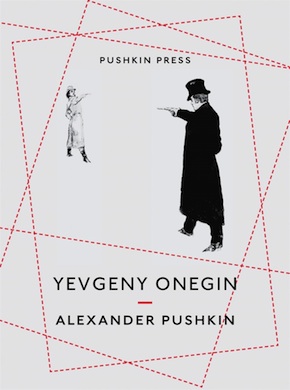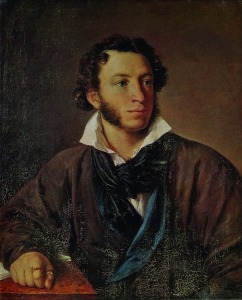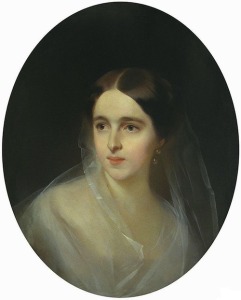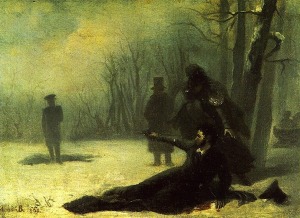Approaching Onegin
by Anthony BriggsAlexander Pushkin is, by universal assent, the most important figure in the history of Russian culture, and his finest work is Yevgeny Onegin (1823–31). He is to Russia what Dante is to Italy, Shakespeare to England and Cervantes to Spain, and for the Russians his novel in verse is a rough equivalent to those other nations’ greatest achievements, The Divine Comedy, King Lear and Don Quixote. Without Pushkin the literature of his country could not have developed in the way that it did, and the Russian language itself would have been different. So, why is Yevgeny Onegin less well known than all the other world-class masterpieces? The answer has to do with the peculiar properties of this work, which underwrite its quality but also make it very difficult to translate. English translations there have been, a dozen or so since the first one in 1869, each of them an enormous achievement in itself, accomplished through hundreds of hours of devoted application and no little talent for the job in hand. English translators of Russian prose are also, in general, good linguists and gifted writers, but in their ranks lurk a good number of rather poor amateur optimists who have not been quite up to the task. There are no such mediocrities in the small field of Onegin translators; all have served Pushkin well. To equal their efforts would be no small achievement, to surpass them may be impossible, but to be different from them (in a carefully considered way) is worth attempting. But first we must look briefly at the man himself, his life and the general run of his work.
Alexander Pushkin, poet, dramatist, novelist and short-story writer, lived a life that was short, intense and largely unhappy. His ancestry is unusual: on his father’s side he came from an ancient noble family, and, on his mother’s, his great-grandfather had been brought as a black slave boy from Abyssinia, eventually to become a long-living favourite of Peter the Great. The poet was always proud of his African origins.
This writer’s greatest achievement, apart from the literary quality of his work as a whole, is nothing less than to have reformed his national language.”
Born in Moscow in 1799, he attended the lycée at Tsarskoye Selo, where his talent for poetry first emerged. In 1817 he entered government service, but because of his liberal views he was exiled to the south in 1820. In 1824 he was dismissed from the service and sent into house arrest near Pskov, from where he did not return to Moscow until after the accession of Nicholas I the following year. Nicholas, aware of the dangerous attitudes displayed by this popular young writer, became his personal censor. Pushkin escaped involvement in the Decembrist revolt of 1825, not least because the serious subversives regarded him as unreliable, but his life in the capital was uncomfortable and fraught with political danger. In 1832 he married a society beauty, Natalya Goncharova, but penurious married life brought him little happiness. He died after a duel defending his wife’s honour in 1837. His had been an unsettled and recurrently troubled life, partly uplifted by his acceptance as an important writer, though even that began to fade as the age of prose stole over the landscape of poetry in which he had thriven. As with Mozart, who died at a similar age, rather than regretting what he might have written had he lived on, the world must be grateful that he wrote so prolifically during his short life. Pushkin was the author of eight hundred lyrics, a dozen narrative poems culminating in ‘The Bronze Horseman’, several dramatic works including Boris Godunov and Mozart and Salieri, a number of stories in prose, the finest of which is ‘The Queen of Spades’, and a large body of critical articles, historical studies and letters. His works are deeply loved, and many of them have been consigned to memory by educated Russians.
This writer’s greatest achievement, apart from the literary quality of his work as a whole, in which the disciplines of classicism mesh with new freedoms released in the age of Romanticism, is nothing less than to have reformed his national language. This bold claim is no exaggeration. As he grew up, the young Pushkin was presented with at least three different linguistic forces existing as separate entities in his large country. Posh people spoke French, ignoring or despising ordinary Russian, though Pushkin heard a good deal of this tongue from the local lads and also from his dear old nanny Arina Rodionovna (who makes an endearing guest appearance as Tatyana’s nurse in the third chapter of Yevgeny Onegin). In addition, he was continually subjected in church and at school to the rich sonorities of Old Church Slavonic. By some miracle, almost without thinking about it, he created modern Russian simply by using it, choosing at will between elegant Gallicisms, vernacular Russian and his nation’s equivalent of our King James Bible and Book of Common Prayer, with a sensitivity to sound, style and meaning that gives him an elevated place in the annals of linguistic reform. The newly expressive modern language was snapped up immediately by writers such as Lermontov and Gogol, and gratefully assimilated by all the (now legendary) Russian authors who followed on so soon. Every writer since Pushkin has acknowledged the latter’s significant contribution to his rapidly developing culture, and they all look back with special affection to Yevgeny Onegin.
Pushkin’s spontaneous incorporation of vernacular speech into ancient and modern Russian was matched by a similar, but more carefully considered, development in his themes, subjects, stories and style. With access to a large library when very young he read voraciously, especially the classics, French Neoclassical works (particularly the stylized seventeenth-century theatre) and not a little English literature. To his eternal credit he chose not to follow the French models. French professors have always controlled their language carefully, guarding it against ‘corruption’ from abroad by scrutinising every new word or phrase, and voting on whether to accept it into the French lexicon or refuse its admission. (Incidentally, I have just checked on Google and discovered to my astonishment that, even in our digital age, the Académie française still operates as the “official moderator of the French language”, insisting that definite rules always be obeyed in the interests of “purity and eloquence”. It is an unpleasant thing to say, but the collapse of the French language from its position as the main language of international communication a couple of centuries ago may owe much to unhealthy overprotection of this kind.)
Pushkin would bring Russian into line with the English language. Here was an impure tongue that had flourished and expanded through promiscuity – she was anybody’s. It was the same story in literature. Take, for instance, the famous and favourite line of French poetry, the Alexandrine, long before Pushkin so tied-down, symmetrical and unbending that it had become tedious. Every line (of twelve or thirteen syllables) must be end-stopped, and at the halfway point it must pause noticeably to create a ‘caesura’. Rhyming couplets were de rigueur, and they must alternate one-syllable rhymes with two-syllable rhymes (hence the twelve or thirteen). What mattered was not the actual ending alone – in the interests of ‘rich rhyming’ you were even required to supply a ‘supporting consonant’ (before the last stressed syllable), which would mean in an English equivalent that bloom/gloom was a legitimate rhyme, but tomb/gloom was not; likewise, belated/related yes, related/created no.
Like his master, the Russian poet wanted every sort of disregarded creature to emerge onto the published page. Commoners would sit down with kings, bawdiness would live alongside beauty.”
Pushkin’s response to all this was to throw the rule book away and elope with Shakespeare, having fallen in love with the Englishman’s unrhymed iambic lines with their asymmetry, free-flowing enjambment, linguistic inventiveness and capacity for springing surprises (such as lapsing occasionally into prose). This libertarian attitude was also applied to subject matter. Voltaire had raised an acidulated protest against Shakespeare’s use in serious drama of the vulgar phrase “not a mouse stirring” on the Elsinore battlements; Pushkin thought the mouse had as much right to be there and to enjoy being mentioned as anyone else in the play. Like his master, the Russian poet wanted every sort of disregarded creature to emerge onto the published page. Commoners would sit down with kings, bawdiness would live alongside beauty, and people of every description would be brought forward.
Take, for instance, an inconspicuous stanza halfway through the first chapter of Yevgeny Onegin (35), in which the jaundiced young Onegin comes back home in the early morning after partying. Interesting and beautiful things are happening all around him, but he is too disaffected and hungover to notice anything. Pushkin rubs this idea in by treating us readers to a little pantomime of morning-fresh activity totally lost on his hero. The morning drum has sounded, telling people to get up and start the day. They have responded as they always do. Out they all come, a dealer, a hawker with his tray, a cabman, a delightful girl from the Okhta district with her milkmaid’s jug, and a fussy German baker busy at his little window, while blue smoke rises in a fine line, showing the stillness of the early day. This a delicious little scene, relevant to the story because its charm is lost on the main character, which tells us much about him, and consisting only of the sights and sounds (and smells from the bakery?) of everyday life. Nothing could be more typical of Pushkin’s manner. You will find another such example in the second stanza of Chapter Five, where another winter morning is brought to life first by a peasant sledging cheerfully through fresh snow, then by a gaudily dressed driver deriving even greater pleasure from hurtling past in a covered sleigh. But happiest of all is a little boy who has made his own form of transport by sitting his little dog up on his sledge while he acts as the driver and mum scolds him through the window. All three are revelling in the natural winter scene, and the little boy would fit straight into Pieter Bruegel’s realistic painting of children’s games that dates back to 1560, were it the right time of year. These modest, anonymous representatives of our species have no obvious claim to intrude upon the pages of a cultural masterpiece, but they add realism and atmosphere, and once you think of them there is no good reason to exclude them. Nothing could be nearer to Shakespeare or more remote from French classicism; none of these people comes near to passing Voltaire’s test of nobility and weighty relevance. Alexander Pushkin’s spontaneous introduction of the common touch into his country’s language and literature is the best thing about him, a stamp of instinctive genius and his greatest claim to fame.
The new interpreter starts out with a strong admiration for Pushkin and his finest achievement, mixed with deep respect for all the amateur versifiers who have already toiled lovingly to transmit some inkling of it into another language. This is the double burden to be borne by any new translator, together with the certain knowledge that the task is literally impossible.
When translating a long prose work it is best to keep well away from earlier translations until you are well into the project. With Yevgeny Onegin, however, the opposite applies.”
One can only hope that the thrilling energy of a Pushkin poem can be released in sufficient quantities for some of it to carry across to the non-Russian mind. This is not quite as hopelessly optimistic as it may seem. Russian and English are closer to each other (with their shared strong word stress, huge vocabulary and wide range of acoustic expressiveness) than, for example, French and English. More specifically, Shakespeare, as we have seen, was ten times dearer to Pushkin than any confection of Racine, Corneille and Molière, and Byron’s irreverent appeal was massively greater than that of Lamartine. Thus there is a small chance of making an English translation sound something rather like the original, whereas a French version of Pushkin is unimaginable. (Is there such a thing? Even the transliteration of the poet’s name tells us something: the English ‘Púshkin’, stressed on the first syllable, looks and sounds quite close to the original whereas the (stressless) French ‘Pouchkine’ has an alien quality, nothing like the Russian.) Armed with this small advantage, we can advance.
When translating a long prose work (as I well know from long experience with War and Peace) it is best to keep well away from earlier translations until you are well into the project. This will avoid all possibility of borrowing or imitation, conscious or otherwise. With Yevgeny Onegin, however, the opposite applies. It is essential to know and judge how previous attempts have tackled the various technical difficulties, such as the English spelling of Russian names, the sonnet-like stanza with its original and slightly complicated rhyme scheme involving many two-syllable rhymes, the variations in language register, the decision to modernize the English or attempt to keep it sounding slightly archaic and self-consciously poetic, and so on. There is a surprisingly wide range of solutions to these problems, and they all need careful consideration.
First, the titular Russian name: Yevgény Onégin, which has not been rendered in this way by any previous translation. The general preference is for ‘Eugene Onegin’, though you will also find the forename written as Evgeny. We are going for a straight transliteration of the original rather than the obvious and popular translation into a near English equivalent. One problem with ‘Eugene’ is that, while the name has been widely used in Ireland and has transferred itself to America by emigration, the rest of the anglophone world is less comfortable with it. It does not sound like something central to English culture, as the Russian name is in Pushkin’s world. The first-syllable stress (Eugene) is also hard to manage, and it will sound odd if it is used to rhyme with ‘seen’ or ‘spleen’. But the most important consideration is simply that the transliterated form preserves a delightful acoustic effect of the original: the fact that these two words (six syllables employing thirteen letters in either language) form a little lyric on their own:
Yevgény
Onégin.
The pleasant euphony of this small phrase is not a thing to be lost. The name makes up a tiny poem in two parts, each consisting of three syllables. (Say it out loud: Yevgény rhymes with ‘rainy’; Onégin is pronounced ‘An-yé-gin’, the ‘o’ being unstressed. Yev-gé-ny An-yé-gin.) It does not matter whether you read each word, technically, as a one-foot iambic line with a feminine ending (i.e. having two syllables, as in habit/rabbit) or treat the two words as perfect amphibrachs (two times te-túm-te); either way you have a couple of perfectly balanced lines in a combination that has an appealing ring. But there is more to it than that. The interplay of consonants and vowels is typical of Pushkin, who is famous for hitting on successful acoustic arrangements apparently through serendipity. Look what happens here. Not only do the two little lines form a strong (if approximate) feminine rhyme (-ény/-égin), but the main letters in the two phrases go like this: e… gén… nég… i, with the first ‘e’ and the last ‘i’ sounding the same (both in Russian like an ‘i’ because the ‘e’ is unstressed). So we suddenly realise that this is a modest example of chiasmus, a device in which parallel forms are presented in one order and then re-presented in reverse (as in, “Nice to see you. To see you nice!”). Thus the name given to the hero sings with its own sweet harmony every time it is used, and since it is possible to fully retain this property in transliteration, we should certainly do so. However, there is irony even in this positive decision: the poetic beauty of this miniature creation is not merited by the hero on whom it has been bestowed: his character and behaviour are not in tune with it, being unbalanced and unbeautiful in the extreme.
Anyone who thinks all of this sounds fanciful could be challenged to change the name to something else, and see if it makes a difference. What if the poet had hit upon Yevgeny Bazarov, Yevgeny Oleshin, or Dmitry Onegin? The story and the characters would remain the same, but some spangle of acoustic refinement would have departed from an important work of poetry; on the finest scale of ideal values this hidden property of a novel in verse would have been thinned down, driving it one nuance away from perfection. The importance of such values to this poet was made clear in a poem of 1829 (‘Winter…’), in which he describes what it is like when inspiration deserts a poet: “The sounds won’t come together…”
The ease with which Pushkin achieves intricate effects like this one reminds me of younger days. At the age of eleven I watched a famous batsman (Len Hutton) compile a score of 104 at Bramall Lane; at sixteen I heard my first Mozart, the clarinet concerto. I remember being struck by the simplicity of the skills used on both occasions. You could obviously rush home and perform this kind of high art yourself, because it was so effortless, except that you couldn’t get remotely near the models when you tried. Pushkin’s poetry is consistently of that order: nearly every line of his seems like a happy fluke that could have happened to anyone, until you try to do it yourself and the lucky chances don’t materialise.
But don’t be fooled by the seductive idea of serendipity. Complex organisation by a master intelligence is the name of the game. If you are prepared to think like a modern physicist, treating the word like an atom, you will find in the subatomic realm a full range of interrelated particles of sound sharing magical relationships. But it isn’t magic, it isn’t luck; it is creative genius in a holiday mood. And Pushkin’s translator must be intimately aware of the imperceptible tricks and forces that drive and decorate his work, not in order to replicate them in some mechanical way, but at least to guide the English language in some appropriate direction, in the hope that now and then a modest turn of phrase will produce the occasional flash of wit, aptness or originality strong enough to bring out a memory of the original.
The ultimate test of a poetic translation of a narrative text is to see how it looks when set out in prose. Despite the constraints of rhyme and stanzaic form it ought still to read fluently, almost like prose. It seems appropriate to end with a random example of a stanza from this new translation that is intended to work that way. Here is a modest offering from Chapter Six (34), which would read as follows if set out in prose:
Imagine this: you with your pistol have murdered someone, a young friend, because some glare, some silly whisper or wrong response chanced to offend your feelings while you drank together, or maybe in his wild displeasure he took offence and challenged you – what is there left for you to do, and will your soul feel any different to see him stretched out on the ground with death depicted on his brow, and even now his body stiffening, as he lies deaf and dumb down there, scorning your cries of wild despair?
This is poetry, but if it also reads almost like prose we are at least on the way towards a reasonable representation of how Pushkin sounds. Beyond that, we can only hope that, to develop an idea from Jorge Luis Borges, the original doesn’t seem too unfaithful to its latest translation.
Adapted from Anthony Briggs’ introduction to his new translation of Yevgeny Onegin, published in the Pushkin Collection series by Pushkin Press.
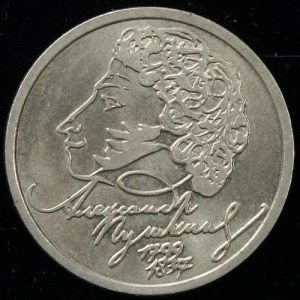 Alexander Pushkin published his first poem when he was fifteen, and in his twenty-first year his first long poem ‘Ruslan and Lyudmila’ made him famous. His inventive and wide-ranging work has secured his place as one of the greatest writers, in any language, ever to have lived.
Alexander Pushkin published his first poem when he was fifteen, and in his twenty-first year his first long poem ‘Ruslan and Lyudmila’ made him famous. His inventive and wide-ranging work has secured his place as one of the greatest writers, in any language, ever to have lived.
Anthony Briggs is one of the world’s leading authorities on the work of Pushkin, and an acclaimed translator from the Russian. He is the author of Alexander Pushkin: A Critical Study and editor of Alexander Pushkin: A Celebration of Russia’s Best-Loved Writer, and his translations include Tolstoy’s War and Peace, The Death of Ivan Ilyich and Resurrection, as well as The Queen of Spades, a collection of Pushkin’s writings published by Pushkin Press. Read more.

